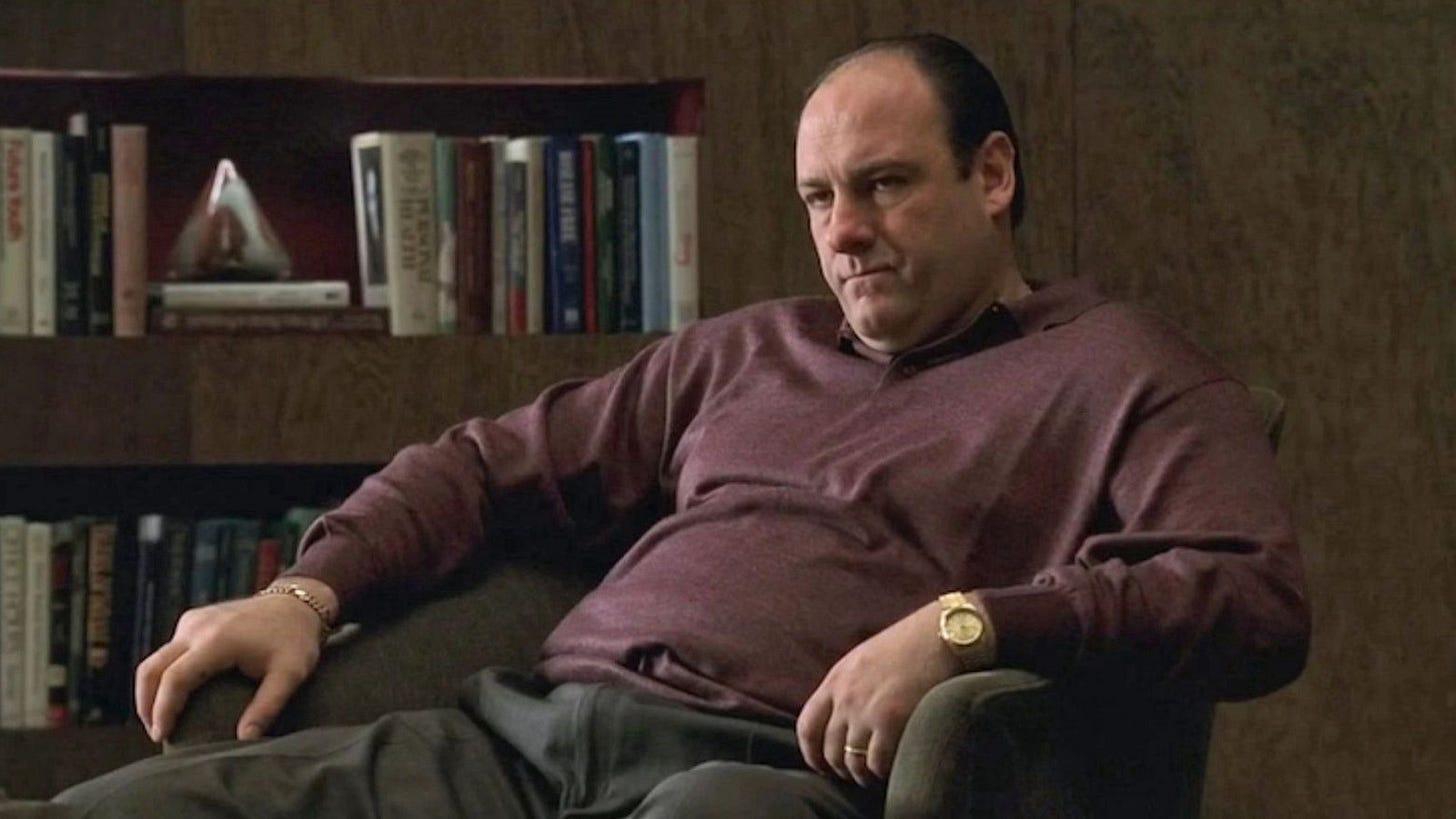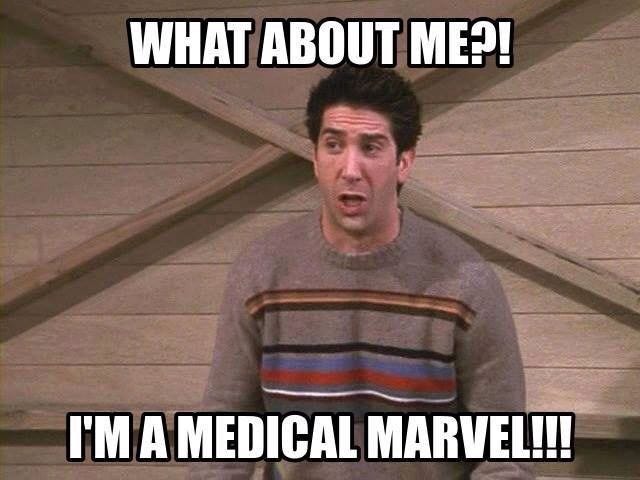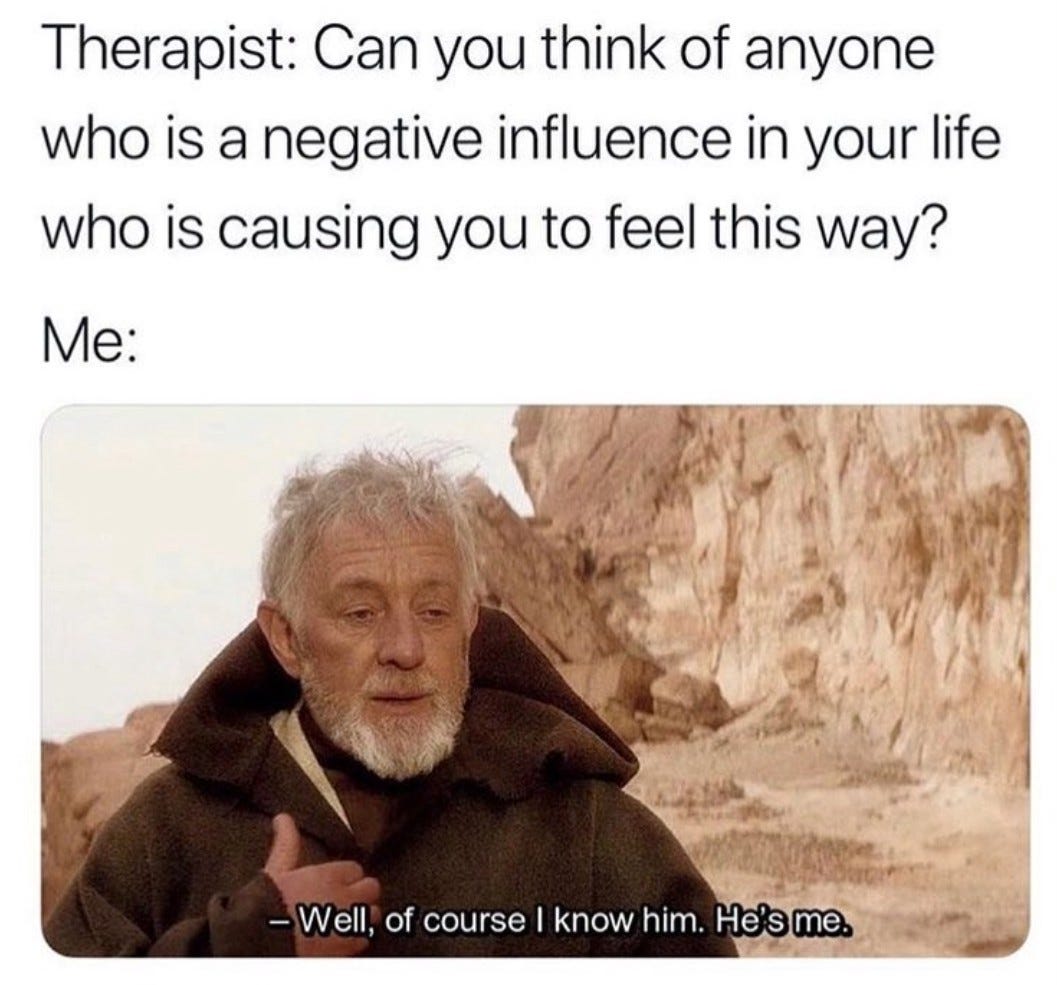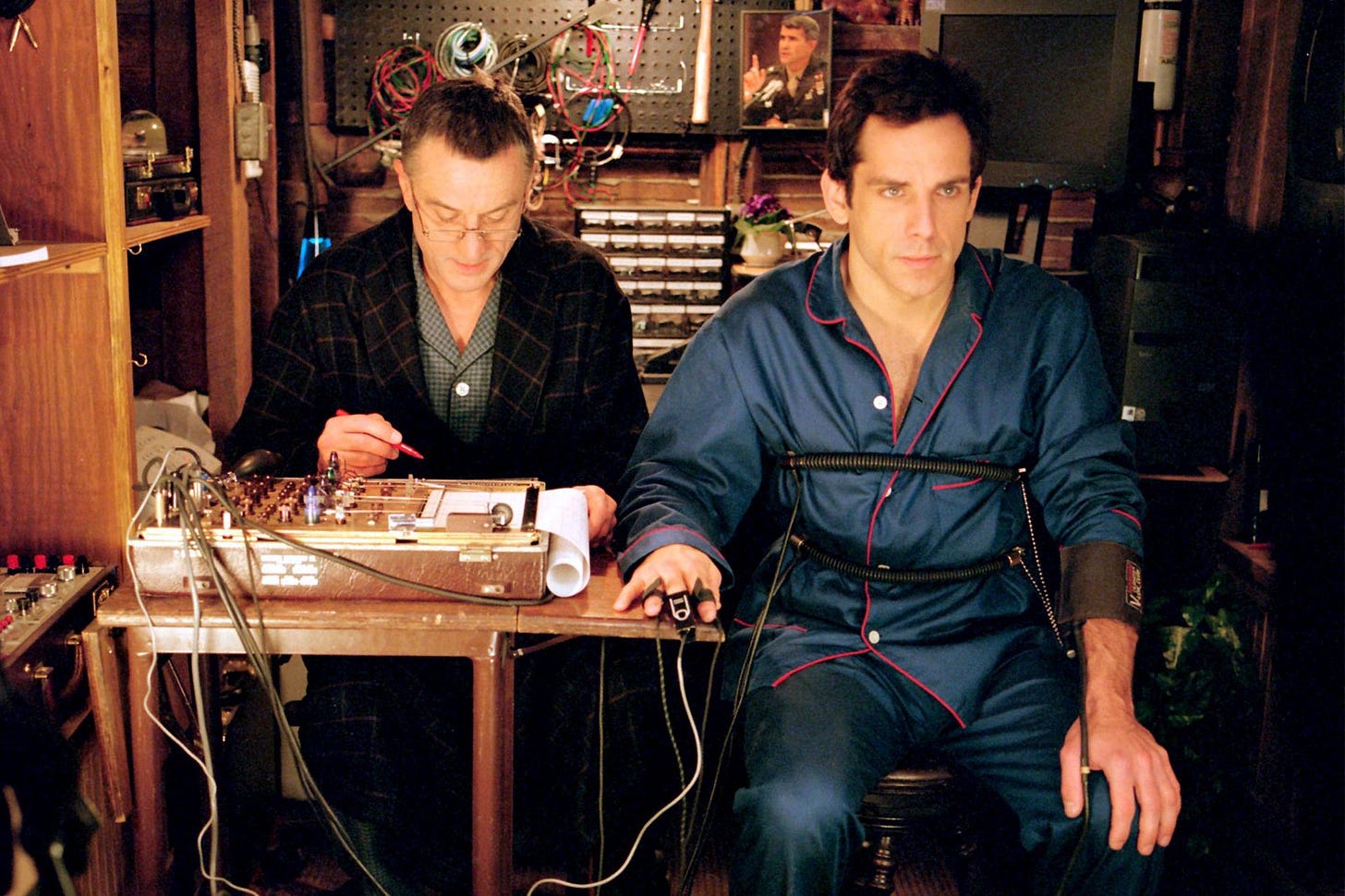“In Hollywood if you don’t have a shrink, people think you’re crazy.”
- Johnny Carson
Ok this one is tough. Heartbreaking, beautiful, scary. It’s also got more triggers than an Only Fools and Horses convention
Ok firstly a couple of caveats:
Therapy is not a Panacea, its not magically going to *fix* you. It works well for some people and not for others. I dipped in and out from time to time, and thought I’d apply my usual light-hearted take on psychotherapy, and address some issues, stigmas and anxieties.
I’m obviously not a therapist, so take this with a pinch of salt, and regard this humble prose as a ‘work in progress’ chapter in my book for divorced dads.
Intro
I never wanted to admit that I needed therapy. I knew I was not ok but my issues with accepting ‘therapy’ were the following:
“I am OK!! I don’t need therapy!”
(I was actually not ok at all)
“I need to find someone who can understand me!!!”
Finding the right therapist is the same as any great relationship, it needs to be the right chemistry. I had no idea this was so important. Also our egos want us to think we are smarter, more unique and more complicated than we actually are, (more on that later…)
“It’s expensive!”
Ah cmon…
You can’t put a price on your mental health
Ok so now we have overcome these issues we can move onto the process of healing:
First things first: You really need to be in the right place to accept the process. This is critical, unless you give it 100% it wont give you the results you expect or deserve.
Don’t be scared, understanding the process is *everything*
Now the scary bit: a good therapist will help deconstruct you and help put you back together. At first it feels scary, intrusive, hyper-personal and awkward. You need to accept that this is all pretty common, quite easy to understand, and if you trust the process you will get better.
Ok but seriously tho how much?
Typically, a 50-minute one-to-one session can range from £40 to £100.
So you CAN put a price on your mental health…
OK smart arse, but you can’t put a price on your own happiness and wellbeing.
Finding the right therapist
Ok this is not like finding a good plumber. Finding a good therapist is a search for a delicate chemistry fit, not unlike any other intimate adult relationship, it’s critical you get the right person and be yourself.
Much like finding the right partner, you will be entering a highly personal relationship. You will give this person the keys to everything that is happening inside your head, share your darkest thoughts, deepest fears and then together you will both try to unpack it all.
Hopefully your journey of sharing and discovery will lead to a much happier, calmer and kinder future, and will help you with future relationships. Here are a few pointers:
It’s good to talk
If you are considering therapy because of your divorce, or need help processing and dealing with this situation then you will probably be looking for counselling.
The NHS website describes counselling as a ‘talking therapy’ where you talk in confidence to a counsellor. They help you find ways to deal with difficulties in your life.
Counselling can also help you understand how your formative years can affect your relationships, and help with self-esteem and anger management.
Themes
Therapists can specialise in different areas, Abuse, Addiction, ADHD, Anger Management, Anxiety etc.
All the ones that start with ‘A’ are the BEST. The rest, meh…
Pick a couple of areas where you feel you need help.
Do a bit of research
Finding the right therapist can be confusing and daunting. It’s worth the effort to speak to a few who look like they might be suitable, in the right place and at the right cost for you.
Male or Female? Age?
This really bothered me, should I get a guy, or a woman. And how old?
My personal choice was an older woman, it felt more natural, I was less likely to procrastinate and I feel personally that all men need to spend more time in the company of female experts, and strong, successful women in general. You are also much more likely to take the advice of a person older than you, and experience is a big plus with therapists. That was my reasoning, yours may differ.
Location
Try to find a therapist that is a small but significant journey away (1–2 miles). You don’t want a therapist who is a neighbour (trust me, bumping into my old one in M&S was cringy)
You also don’t want to bump into someone you know, whilst waiting on foot or parked up outside your therapists house or office, and it’s nice to have a decent walk before and after therapy. You may also need to have a cry after your session, sit in a park and reflect, or go to the pub for some beer. This is nobody else’s business. There can be a stigma around therapy and medication etc and you don’t need that heat.
Try before you buy
Like all good drug dealers, your first hit is usually free.
All reputable therapists will offer an initial, free chat with you to gain a basic understanding of your situation and circumstances and can kindly feedback whether they are suitable, based on this initial broad information.
After that you go to see them for an initial session, sometimes this will be reduced fees but you need to get your head round the fees. Therapy is expensive, some therapists have a sliding fee scale based on your income but mostly you are in for, at minimum, 12 sessions. Most therapy is once a week, and can be for 12–18 months. Again, this is a guide but as I advise later, its all arbitrary.
Some therapists are rubbish
Its important to know that if, for whatever reason, you have a bad feeling about your therapist, just say thanks and find another one. Some therapists are quite frankly, rubbish. I had some absolutely terrible ones. Here are some common red flags to look for:
Lack of boundaries and professionalism
A therapist should never touch you, never ask you inappropriate or intimite questions, (unless its relevant and you have clearly initiated it) As with most relationships, respecting boundaries is paramount to trust. A therapist should never be late, never take a call or answer the door, or be distracted during your session. A therapist should not be contacting you out of hours, unless it is of paramount direct importance to your booked sessions (cancellation or booking). Your therapist is bound to confidentiality, they should never share any of your information with others. If your therapist tell you a story about another one of their other clients, even in a confidential manner, leave immediately.
2. Empathy
Empathy is considered to be one of the most important therapeutic relationship skills for improving health. A good therapist will show empathy and compassion to you at all times, this is critical for connection, trust and creates a safe space
3. Bad credentials or lack of training
Make sure you get to see their certificates, and any other qualifications. Ask them how long they have been practising. Remember, you are paying a lot of money and don’t need your time wasted. Its ok to do due diligence
4. Excessive Self-Disclosure
Therapists will sometimes share their own personal experiences as a way to foster a bond or connection or to gain trust. This can be beneficial, especially at the start. If however, they start to over-share, its a big problem. Its not about them. Its about YOU. If they start talking about their personal life, their kids or how your issues might affect them, its time to leave
5. Poor Communication
A good therapist will be able to understand the problem, and be able to communicate, clearly, in simple terms, relevant information back to you. You are not buying a degree in Psychology. You should not need to go home after and Google terminology.
If you can explain your issues simply to friends and family, and they understand, then any decent therapist should be able to too. And any ‘expert’ is defined by being able to explain things in simple terms. This is not a formal education, its not a cerebral power up. Its understanding of behaviours.
6. Unfair Judgments
Asking questions, giving direction or feedback, creating scenarios, all fine. Making judgements and causing embarrassment or shame, thats not ok.
8. Setting unrealistic goals
A good therapist should be able to assess and explain how they will be able to help, along with a rough estimate of a timeframe. If they tell you its 12 sessions, or 6 months, or give you other false promises based on unrealistic goals, thats a red flag
Everyone is different, your expectations should reflect that.
9. Forgetfulness/absent mindedness.
Your therapist should never have to try to remember your name, or have to refer to endless notes to be able to get through your session. Therapists need to be able to hold a large amount of information about a variety of clients. If they are forgetting stuff or mixing you up with another client, they either have too many clients, or not enough memory.
10. Unchallengeable.
To get the most out of therapy you will need to challenge a therapist, push back, give feedback and even strongly debate the information you receive. You may often be upset, scared and acutely defensive. That is your prerogative.
A decent therapist will have no problem with this, and wont get cross, angry or irritated. Thats part of their their training. If your therapist starts arguing with you, becomes defensive or cant simply deal with being challenged, then you should find another therapist.
Your issues are quite simple to diagnose
As I said earlier, our egos and our internal dialogue want us to think we are smarter, more unique and more complicated than we actually are. The truth is we are all pretty simple to diagnose. Most of the basic issues that human beings go to therapy for are commonly experienced by most people, they are just more chronic and less bearable for some. For a trained Psychotherapist the diagnosis is easy bit, it’s what you both do with the diagnosis that’s the hard bit
You are not special
Look I know this seems mean, but you are *not* special. You are brilliant, and there are people who love you dearly, but you are a human being, a version 1.0 Homo sapien. You have issues, emotional baggage, battle scars and a fuck ton of regret.
You are not some mental health anomaly, medical marvel, or a once in a generation mind.
But this is all standard. Its refreshing to know you are not alone, and there are millions of people just like you, going through the same stuff.
You are your own worst enemy
The goal of therapy is to identify your own behaviours and to try to help you manage and lessen the ones that are having a negative impact on your life, and particularly your relationships with others. When you are in trauma, you are programmed to make everything worse.
It’s not just you, it’s your parents
Oh boy… the naked truth is that a lot of your issues are *actually* not your fault.
A decent therapist will start to delve into your childhood. This is profoundly uncomfortable, as we all give our parents the hero status that we feel they deserve, but they are just as fucked up as the next guy.
Your parents tried their best, and deserve the utmost respect, but their behaviour shaped you, and you are going to have to, even low level, hold them to account.
Your experience with your parents during your formative years is the biggest influence on how you turn out, how you deal with adult relationships and ultimately, what shapes your future.
If one or more of your parents are abusive towards you, then thats absolutely what your therapy will be about, and welcome to the conversation. (I’m getting jackets made for all the fucked up but wonderful misfits)
Divorced parents
It’s not your fault. It’s ABSOLUTELY not your fault.
Your parents did you a solid by splitting up, nobody want to live in a home bereft of love, and full of conflict, but its had a huge effect on how you actually turn out, and most of it is not good.
Children from divorced families are more likely to experience behavioural disorders, delinquency, impulsive and problematic behaviour and conflict with peers. Also they are more likely to engage in substance abuse and sexual activity, alcohol consumption, marijuana, tobacco, and drug use than their peers.
But enough of the good points! (I jest)
Studies show adolescents whose parents divorced when they were 5 years old or younger were at particularly high risk for becoming sexually active prior to the age of 16.
Yeah thats genuinely an issue.
Separation from fathers has also been associated with higher numbers of sexual partners during adolescence.
Ah the old ‘low self esteem’ it's why we do all the stupid shit that we do.
10 things to consider
Therapy is very personal, but here is some sage advice:
Don’t lie. Don’t ever lie or withhold the truth. You are just wasting money and creating a paradoxical ‘versioning’ of you and your issues. Also any therapist worth their money will sense of spot this.
Not all therapists are ‘smart’. Basically anybody can become a therapist, as they can a life coach. Or a fucking chiropractor, but I digress… becoming a trained therapist does not require a degree in Psychology and in a lot of cases it is what people do as their ‘second career’.
A lot of therapists are pretty messed up themselves. It’s partly why some people become therapists. Adjust your expectations accordingly
As a man, I strongly recommend seeing a female therapist. It's a much deeper connection, and for some men it is a wonderful example of a positive female role model, a stable and trusting ‘relationship’ and my goodness, men need more of these.
Don’t waffle. I struggle with brevity, and I am a chatterbox. You only have 50 minutes a session, so get to the point. Your therapist is not your mate, they are not interested in how good your cooking is, or what you watched on TV last night.
Don’t be afraid to ask for answers. A lot of good, direct therapists will fire truth bombs at you that you are not prepared for, call you on your bullshit, and give it to you straight. This is really harsh but wonderfully refreshing. Take your beating and let your wounds heal. This is part of the process
Don't expect quick wins, or deal with low hanging fruit. Thats what drinking alcohol with your mates is for. Pub wisdom will always sort out that surface level stuff. For the subcutaneous stuff you need a therapist. Learn to triage.
Get comfortable with the concept of disparaging your parents. They are not your heroes and they were just trying their best. All parents make mistakes.
Therapy is not about right and wrong, who did what to whom, and who is ‘to blame’. This is not a blame game, it’s about trying to establish the ‘why’ in your behaviour, and your ability to maintain relationships.
Quantifying ‘success’ in therapy is a tough one. You may find your life easier after 18 months of therapy, you may not. You life is a journey, therapy is a process, and its just one part of trying to rebuild yourself after trauma, don’t expect a transformation, this is rarely the case
Thanks for reading!








